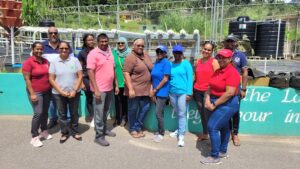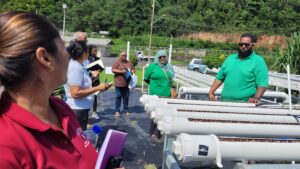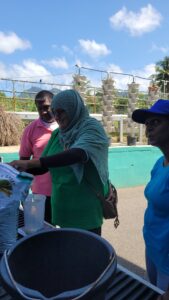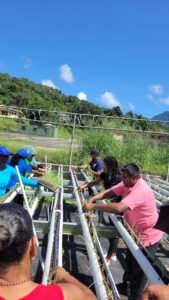Written by Laura Ram – Assistant Secretary – 4-H County Caroni
20-10-2024
FAO UN/4-HTT Hydroponics System Training for Voluntary Leaders.
To promote food sustainability across schools in Trinidad and Tobago, twelve (12)
 4-H voluntary leaders from various schools across the island gathered for a comprehensive two-day workshop held on Friday 18th and Sunday 20th of October 2024 at Caribbean Union College, Maracas St. Joseph. The training, held under the joint initiative of the Food and Agriculture Organization (FAO) and 4-H Trinidad and Tobago (4-HTT), provided participants with the knowledge and skills needed to install, manage, and maintain hydroponic systems at their respective schools.
4-H voluntary leaders from various schools across the island gathered for a comprehensive two-day workshop held on Friday 18th and Sunday 20th of October 2024 at Caribbean Union College, Maracas St. Joseph. The training, held under the joint initiative of the Food and Agriculture Organization (FAO) and 4-H Trinidad and Tobago (4-HTT), provided participants with the knowledge and skills needed to install, manage, and maintain hydroponic systems at their respective schools.
This hydroponics initiative is part of a broader effort to enhance food security and sustainability, especially within the school environment, by equipping future generations with the tools and understanding necessary for efficient food production. Hydroponics, a method of growing plants without soil, offers several advantages, including the ability to grow food in a controlled environment, conserve water, and produce high yields in small spaces, making it an ideal solution for schools with limited land resources.
Training Objectives
The workshop was designed by NutricultureTT to ensure that the volunteer leaders, who serve as mentors and guides within the 4-H clubs in schools, were fully equipped to manage the hydroponic systems that will soon be installed in selected schools. The training covered a range of topics essential to the successful implementation and sustainability of these systems, including:
System Setup: Participants were educated in the installation of hydroponic systems, focusing on the necessary equipment, space requirements, and system types.
Nutrient Management: An important component of hydroponics is managing the nutrients that plants need to grow in a soilless environment. The volunteer leaders learned how to properly mix and maintain nutrient solutions for optimal plant growth. 
Water Management: Since hydroponic systems rely heavily on water circulation, the training emphasized water conservation techniques, as well as methods for maintaining clean and disease-free water environments.
Plant Selection and Care: The leaders were introduced to the types of crops best suited for hydroponic cultivation in Trinidad’s climate, and how to monitor plant health, identify common pests and diseases, and ensure proper growth cycles.
Sustainability Practices: Beyond the technical aspects, the workshop also focused on how to maintain the systems over time, and the importance of involving students in the process to encourage a culture of sustainable farming.

Impact on Schools
The FAO/4-HTT hydroponics initiative is expected to be a game changer for the selected schools. By teaching students, the value of sustainable farming practices and food production, this program aligns with both national and global goals of promoting food security, reducing waste, and increasing agricultural education.
For many of the schools involved, the installation of hydroponic systems will provide fresh produce to complement their school feeding programs, creating a direct link between education and nutrition. Furthermore, the program empowers students to take an active role in growing their own food, fostering a deeper understanding of agriculture and its impact on their communities.
The volunteer leaders, who now serve as ambassadors for this initiative, are expected to spearhead the installation and day-to-day operation of these hydroponic systems at their respective schools. Their role is critical in ensuring that the systems are not only installed correctly but are maintained and operated efficiently over the long term.
Looking Ahead
 As the hydroponic systems are rolled out across the island, FAO and 4-HTT will continue to provide support to ensure that the schools can successfully integrate the systems into their daily activities. This initiative marks a significant step forward in promoting food sustainability and environmental stewardship among young people in Trinidad and Tobago.
As the hydroponic systems are rolled out across the island, FAO and 4-HTT will continue to provide support to ensure that the schools can successfully integrate the systems into their daily activities. This initiative marks a significant step forward in promoting food sustainability and environmental stewardship among young people in Trinidad and Tobago.
The training workshop at Caribbean Union College represents the beginning of a transformative journey for the schools involved, with the potential to inspire future generations to take an active role in agriculture and sustainability.
The FAO/4-HTT collaboration has laid the foundation for a more sustainable and food-secure future, one where students and educators alike can contribute to creating resilient communities through innovative agricultural practices like hydroponics.
Special thanks to the very knowledgeable facilitators Mr. Darian Ramesar and Mr. Daryian Dolly of NutricultureTT . email nutriculturett@gmail.com
Participating 4-H Schools and Volunteer Leaders.
- Buttercups 4-H Club – Belmont RC Primary School – VL -Ms. Alicia John
- Green Thumbs 4-H Club – San Fernando Girls Government Primary School- VL -Ms Rohini Mohan
- Periwinkles 4-H Club– Princess town Presbyterian Primary #2 – VL- Ms. Aneesah Mohammed
- Evergreen Thumbs 4-H Club -La Pastora Government Primary School – VL – Ms. Shera Diaz
- Icacos Gems 4-H Club– Icacos Government Primary School- VL – Mr. Richard Bisnath
- Longdenville Green Thumbs 4-H Club– Longdenville Presbyterian Primary School- VL- Ms. Arlene Roodalsingh
- Agri- Avengers 4-H Club– California Government Primary School – VL- Ms. Laura Ram
- Dynamic Innovators 4 -H Club– Bethlehem Boys RC Primary School – VL- Ms. Marsha Letren
- Green Innovators4-H Club – Biche RC Primary School -VL – Mr. Shawn Bousignac
- United Hands 4-H Club– Barrackpore ASJA Primary School- VL- Ms. Karen Bharath
- Agristers 4-H Club – Williamsville Secondary School -VL- Mr. Wazim Karim, VL- Ms. Venessa Seecharan.
- Green Thumbs 4-H Club -Buenos Ayres Government Primary.

